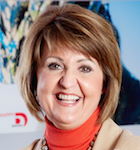The goal of any entrepreneur is to find an untapped market, and typically, the bigger the better. Chris Rondeau, the chief executive officer of Planet Fitness, has done exactly that, with approximately six million members today who otherwise might not belong to a gym. “Only 15 percent of Americans belong to a health club,” explains Rondeau. “We decided to go after the other 85 percent.”
What’s remarkable is that this untapped fitness market was hiding in plain sight. Rondeau, who joined Planet Fitness in 1993, a year after its founding, worked with cofounders Marc and Michael Grondahl to tap a new market, and the discovery of the company’s members—who are less charmed by traditional gym culture—came somewhat by accident. The firm’s first clubs in the early 1990s were in New Hampshire, where the company and competitors chased after similar member types: fit people for whom special classes, juice bars, pools, and saunas hold appeal. The price point there averaged $50 per month with ironclad, long-term contracts. That’s when Planet Fitness zigged where others zagged—when it was a mere four “stores,” as Rondeau refers to them—they devised a pared-down, lower-priced club that proved to be all their customers really wanted.
Rondeau also zeroed in on the idea that workouts are perceived as a chore, something that may be necessary but largely not fun—“like mowing the lawn,” he says. Add to this the fact that the atmosphere of most gyms can be intimidating, particularly if club advertising focuses on the already fit, sweaty “hardbodies,” rather than being welcoming to someone who never envisions actually being that fit.
The formula worked. Planet Fitness grew to 825 clubs by mid-2014 and has more than 1,000 new clubs in the pipeline, which Rondeau says are already in committed contracts with new and existing franchisees. Of the total club count to date, only fifty-four of those clubs are corporately owned—the franchising model is an essential part of the company’s growth.
The Planet Fitness unorthodoxy includes its franchisees. They, too, are not necessarily gym people. “Up until the early 2000s, our franchisees were existing gym owners who were looking for a better system,” says Rondeau. “But we found that business investors, people who may already own a franchised business in another industry, make great owners as well. They know how to follow a playbook, and they aren’t interested in reinventing anything.” Instead, an effective management team is what succeeds best.
Those franchisees also need to understand the Planet Fitness club culture. The decidedly anti-hardbody décor includes a “lunk alarm” that signals when a member behaves in a stereotypical gym fashion (grunting, throwing down weights, strutting and posing, etc.). Club signage extols this philosophy of “No Gymtimidation” and the “Judgement Free Zone.” And all Planet Fitness clubs provide free pizza night to members one Monday per month. “It’s not just about hard work here—people deserve to splurge once in a while,” Rondeau says.
The gym’s appeal has remarkable breadth, perhaps because of its pricing model. For $10 per month, members get twenty-four-hour access to quality equipment, with nary an aerobics class, juice bar, pool, or sauna in sight. Note that’s $10 in Wichita, Kansas, and $10 in midtown Manhattan.
To grow the company from its base in Newington, New Hampshire, and to continue tapping into a huge, underserved market, the firm’s founders inked a deal with a private equity firm, TSG Consumer Partners, in 2012. With capital to find good locations (“convenient with lots of parking,” says Rondeau), averaging 20,000 square feet of space, the company pushes to eventually have more than 2,000 locations. The clubs are currently concentrated in the eastern half of the United States, with the least-tapped markets west of the Mississippi. Forbes magazine ranked Planet Fitness as third in the top ten franchise organizations in the United States in 2013. (The list also scored Planet Fitness an A for franchisor support.)
In 2010, Rondeau’s marketing team locked in the ideal television vehicle, the hit ABC-TV reality show The Biggest Loser, to find its members and new franchisees. But while the show’s epic moments involve a climactic weigh-in, no scales—and few mirrors—are to be found at a Planet Fitness location. As Rondeau explains, you can change a life when you simply get someone off the couch and onto a treadmill. After all, that is what 85 percent of Americans really want—and need.

